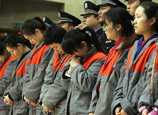
Critics said these investments, dominated by government agencies, often bring a low return and
the last massive stimulus plan, during the 2008-09 financial crisis, caused the current overcapacity.
Nie Riming, a researcher with the Shanghai Institute of Finance and Law, said interest rates, not the size of the investment, are the real problem.
If they are set too low, local governments will be emboldened to borrow without considering the potential return.
Li Lihui, president of the Bank of China, suggested the country should make employment the major target.
He said attention should be paid to job creation not only during the construction period of the investment, but also during the operation phase, after the investment is concluded.
But there are supporters of using fixed-asset investment as an economic booster.
In the annual session of the Guangdong Provincial Committee of the Chinese People's Political Consultative Conference, that concluded last week, some members said investment is critical to the province's growth.
Xu Shaohua, deputy governor of Guangdong province, said the government would encourage the private sector to boost investment.

















 High-profile divorce saga ends
High-profile divorce saga ends


![]()
